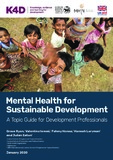| dc.contributor.author | Ryan, Grace | |
| dc.contributor.author | Iemmi, Valentina | |
| dc.contributor.author | Hanna, Fahmy | |
| dc.contributor.author | Loryman, Hannah | |
| dc.contributor.author | Eaton, Julian | |
| dc.date.accessioned | 2019-12-20T10:40:05Z | |
| dc.date.available | 2019-12-20T10:40:05Z | |
| dc.date.issued | 2020-01-20 | |
| dc.identifier.citation | Ryan, G., Iemmi, V., Hanna, F., Loryman, H. and Eaton, J. (2019). Mental Health for Sustainable Development: A Topic Guide for Development Professionals. K4D Emerging Issues Report. London and Brighton, UK: Mental Health Innovation Network and IDS. | en |
| dc.identifier.uri | https://opendocs.ids.ac.uk/opendocs/handle/20.500.12413/14908 | |
| dc.description.abstract | While many development professionals recognise the need to do more for mental health, they do not always know where to begin. This topic guide is intended as a primer for development professionals interested in learning more about the basics. Mental health affects us all. Mental health is a continuum, ranging from good mental health and wellbeing at one end, to substantial personal suffering and impairment at the other. Everyone has mental health, and mental, neurological, and substance use (MNS) conditions can affect anyone. Together, MNS conditions are the number one cause of years lived with disability (YLDs) worldwide and are responsible for at least 10% of all disability-adjusted life years (DALYs). One in four people will develop a mental health condition in their lifetime, and one in six is living with a neurological condition. The number of people living with MNS conditions is expected to increase dramatically in coming years as population sizes and life expectancies rise, especially in
low- and middle-income countries (LMICs). People with MNS conditions are often in vulnerable situations. Many people around the world believe that MNS conditions are the result of personal weakness or supernatural forces, and that people with MNS
conditions pose a danger to society. This can result in harmful treatment practices, exclusion from family, community, work, and civic life, inequitable access to health and social services, and ultimately social and economic deprivation, as well as injury, poor health – even death. It is society’s negative response to MNS conditions that makes them so profoundly disabling. Yet the
voices of people with psychosocial disabilities are often left out of the disability movement. In many LMICs especially, people with psychosocial disabilities have little control over their own lives and few opportunities to take a stand against stigma, discrimination, and abuse. | en |
| dc.language.iso | en | en |
| dc.publisher | Mental Health Innovation Network and IDS. | en |
| dc.relation.ispartofseries | K4D Emerging Issues Report; | |
| dc.rights | The production of this material has been funded by UK aid from the UK government. The authors alone are responsible for the views and opinions expressed, and they do not necessarily represent the decisions, policies, or views of K4D, CBM International, Sightsavers, the London School of Economics and Political Science, the London School of Hygiene and Tropical Medicine, the UK government, or the World Health Organization. This topic guide is licensed for non-commercial purposes only. K4D or any other contributing organisation cannot be held responsible for errors or any consequences arising from the use of information contained in this topic guide. | en |
| dc.rights.uri | https://www.nationalarchives.gov.uk/doc/open-government-licence/version/3/ | en |
| dc.subject | Health | en |
| dc.title | Mental Health for Sustainable Development: A Topic Guide for Development Professionals | en |
| dc.type | Emerging Issues Reports | en |
| dc.rights.holder | © DFID – Crown copyright 2020. | en |
| rioxxterms.funder | Department for International Development, UK Government | en |
| rioxxterms.identifier.project | K4D | en |
| rioxxterms.version | VoR | en |
| rioxxterms.funder.project | 238a9fa4-fe4a-4380-996b-995f33607ba0 | en |

